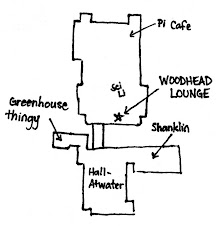 Since today is the day of the New Hampshire Primary, I added a green candidates widget to the blog (it's underneath the "Beyond Wes" links section). Check it out! Grist has a really great section on their website about each of the candidates (My favorite part is the chart).
Since today is the day of the New Hampshire Primary, I added a green candidates widget to the blog (it's underneath the "Beyond Wes" links section). Check it out! Grist has a really great section on their website about each of the candidates (My favorite part is the chart).As I was exploring the chart, I realized that I definitely didn't understand what the deal is with the cap-and-trade system and the carbon tax. Well, now what I understand is this:
First of all, there are different types of cap-and-trade. One is called grandfathering, in which carbon credits are basically given to corporations for free. The other is auctioned cap and trade, in which credits are auctioned (duh, I know, but bear with me). Anyway, the difference is a question of who keeps the revenue (with grandfathering, the companies hold on to it). With both the auctioned cap and trade and the carbon tax the government keeps the money.
A big point of difference between the cap and trade system and the carbon tax thing is that the carbon tax provides price certainty (the price of carbon is set) whereas the cap and trade system provides certainty about the actual emissions reductions (all that is from this article, which I found through this article (also informative), which I found through Grist).
There was a lot of back-and-forth about the issue on Grist in early 2007, so if you're interested in reading more, here's a list of some relevant articles.
Gary Yohe's position is in favor of a carbon tax. Here's an excerpt from a Scientific American article that appeared in November:
SA: What is a good policy solution?
GY: I prefer a carbon tax for lots of reasons. I think that it would be easier to administer. There are a few thousand points of entry for carbon in the U.S. economy and a few tens of millions points of entry for carbon into the atmosphere. The revenue from a tax could be used for lots of smart things, like technology research and development or reducing the regressivity of the climate tax by lowering the income tax. You could also pay to reduce the vulnerability of people who work in sectors particularly hard hit by climate policy. Or the carbon tax could be used to underwrite carbon mitigation options; you could, for example, buy back the carbon if someone has taken the initiative to develop a way to capture and store it.
I don't prefer cap and trade in the case of carbon dioxide, even though it worked for sulfur dioxide in this country. Unlike acid rain damage, which depends on current sulfur emissions, all you need in the case of carbon is for the average emissions to fall in a predictable trajectory so their sum over 100 years falls below a desired target. Whether it's high or low in one particular year doesn't matter. It is most economically efficient to allow emissions to bounce around an average as they move along a lowering trajectory. A tax allows that, cap and trade doesn't.

No comments:
Post a Comment